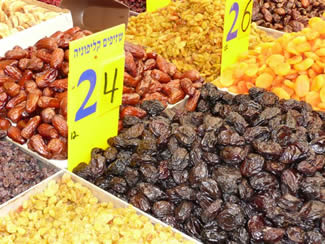- Home
- Play & Learn Home
- Online Enrichment
- Experience Modern Israel
- Israel It's Complicated
- Jewish and Me
- Jewish Holidays Jewish Values
- Jewish Values in Genesis and Jewish Values in Exodus
- Min Ha’aretz
- Our Place in the Universe
- Simply Seder
- The Prophets: Speaking Out for Justice
- Making T'filah Meaningful
- Make, Create, Celebrate
- Yom Haatzmaut Resources
- Hebrew Apps
- About The OLC
- What is the OLC?
- Introduction
- Get Started
- Resources
- OLC Content
- Parent Materials
- See My OLC Classes
- Store
In the Classroom
5 Ideas for a Tasty and Terrific Tu B'Shevat
Five healthy and environmentally friendly activities to help students experience the wonder of nature through Jewish eyes and celebrate a memorable Tu B'Shevat.
By Sunny Yudkoff
This year, Tu B’Shevat falls on January 22nd. For those of us in cooler climates, celebrating this Birthday of Trees may seem hard. Besides the occasional evergreen, what blossoming trees are there for us to celebrate? What fresh fruits ripen under January’s dark clouds? What plants take root in frozen soil?
Still, we want our Tu B'Shevat—no matter what the forecast—to be delightful and, most importantly, delicious. Below are five ways to ensure that your Tu B'Shevat celebration will cure the winter doldrums and set the stage for a memorable holiday:
- Tu B'Shevat Taste Test.

Invite students and families to a school-wide Tu B'ShevatTaste Test. Place fresh and dried fruit on plates around the room. Have attendees rate their favorites on score cards with two columns of boxes: one labeled with the name of a fruit andone blank for scoring. Ask tasters to try the various fruits and to rate them from 1–5 (with 5 being the tastiest). See which fruit wins! Did the Israeli dates please the most palettes? Were the organic grapes the surprise hit? How well did the Jaffa oranges fare? Consider turning this gourmet extravaganza into a lesson on Israeli agriculture or sustainable farming.
-
Tu B'Shevat Texts.
Rabbi Nahman of Bratslav taught, "It is special to go out into the fields at the start of spring when nature awakes from her sleep, and to pour out a prayer there." Anne Frank wrote, "The best remedy for those who are afraid, lonely, or unhappy is to go outside." So many great Jewish thinkers and figures have described the beauty of nature and the relationship of nature to the Jewish people. Copy down several of these texts and post them on the walls of the classroom. Give students several minutes to read the posted quotes. Instruct them to stand next to their favorite one. Encourage class-wide discussion by asking students to explain their choices.For a variety of quotes, including those of Rabbi Nahman of Bratslav and Anne Frank above, check out Spirit in Nature: Teaching Judaism and Ecology on the Trail, which draws on Jewish liturgical and historical sources to examine the connection between Jewish spirituality and the appreciation of nature. This exercise also works well in adult education classes.

Tu B'Shevat Iron Chef.
Do your students love the Food Network's Iron Chef? Challenge them to a Tu B'Shevat Iron Chef contest. Provide students with fresh fruit, dried fruit, and seeds, and challenge them to create the most extravagant and tastiest platter that highlights the "secret ingredient" you provide, such as Israeli fruits, for example, a pomegranate or dates. Alternatively, instruct students to use ingredients to create a map of Israel. Imagine the Negev made out of sunflower seeds, the Judean Hills built from dates, and the snowy peak of Mt. Hermon flecked with dried coconut.-
Tu B'Shevat Field Trip.
If the weather permits—even if you have to dress warmly—take your students on a Tu B'Shevat Field Trip. Make the lessons of the holiday concrete by allowing students to explore the importance of nature while they are in nature. No matter where you take them, be it the woods behind your synagogue or the front lawn of your religious school, encourage students to remember that the environment is precious. Ask them to consider that everything in the world—humans and nature—have a relationship with God. Check out Spirit in Nature for thought-provoking questions to ask during the field trip; for example, why is the Torah called a Tree of Life? how can being in nature help you feel the presence of God?While you are outside, you might also consider distributing garbage bags and gloves so students can pick up any litter. Or, brainstorm with students ways to help your religious school "go green," recycle more, and waste less. Consider electing one student to lead a Kvutzah Yerukah (Green Team) that will help implement the environment-friendly suggestions.
-
Tu B'Shevat Seder…with Guests!
This year, organize a Tu B'Shevat seder that will be memorable, meaningful, and modern. For an easy-to-follow seder with attractive downloads, visit the Babaganewz web site. And, be creative in your planning! On Passover, we invite Elijah the Prophet to attend our Seder. This Tu B'Shevat, continue the mitzvah of hachnasat orhim (welcoming guests) by inviting a local farmer or food cooperative representative to join you at your Tu B'Shevat seder. Encourage students to prepare for their guests by visiting a local farmer's market or researching contemporary food movements such as those that advocate eating locally grown, organic, or fair trade food. Make the seder and the environmental lessons of Tu B'Shevat relevant to every student's life—and eating habits!
No matter what the weather is in your community this January 22nd, Tu B'Shevat is a great time to celebrate nature—indoors or out. Have a happy and yummy Tu B'Shevat!


